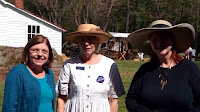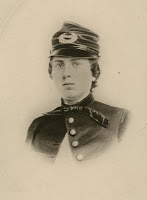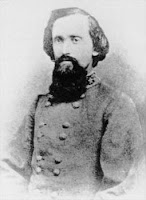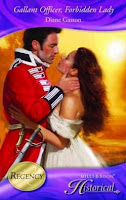I live in Virginia, a state area steeped in history, from the first English settlements to the homes of our founding fathers, to, most tragically, the American Civil War.
Our state is filled with Civil War battlefields and historic sites. Our highways are dotted with historic markers: Mosby’s Midnight Raid, Battle of Ox Hill, J.E.B Stuart at Munson’s Mill. Right down the street from me is St. Mary’s Church where Clara Barton nursed the wounded from the Second Battle of Manassas and was then inspired to found the American Red Cross. 
This past Saturday, my husband and I went with our friends, Helen and Eugene, to their neighborhood historic site, Blenheim (the Fairfax, VA one, not that Blenheim), for Civil War day.
 Blenheim is a unique Civil War site. It’s house was built in 1859, and its plaster walls had not yet cured enough to be painted or papered when Union soldiers were billeted there in 1861. The walls became the soldiers’ canvas for graffiti. When the house and property was acquired by Fairfax City, the house was restored to the original plaster to reveal this historic graffiti.
Blenheim is a unique Civil War site. It’s house was built in 1859, and its plaster walls had not yet cured enough to be painted or papered when Union soldiers were billeted there in 1861. The walls became the soldiers’ canvas for graffiti. When the house and property was acquired by Fairfax City, the house was restored to the original plaster to reveal this historic graffiti.
 As we watched the reenactors or listened to the band play Stephen Foster songs, I wondered why the Civil War had never captured my interest as a romantic time period. Why had I picked Regency England instead?
As we watched the reenactors or listened to the band play Stephen Foster songs, I wondered why the Civil War had never captured my interest as a romantic time period. Why had I picked Regency England instead?
We have some basis for finding the American Civil War romantic: Gone With The Wind, North and South (the Patrick Swayze 1985 version, not the Richard Armitage one), a whole list of Romance novels . But it certainly does not seem to have the same appeal as the Regency.
Most obvious for me is the difficult issue of slavery, a dark blot on our country’s history. It is hard to craft a Civil War story without somehow touching on the issue of slavery. Even if you can demonize the Yankees, like in Gone With The Wind, can you really make the Rebels heroic if they support owning slaves? How do you pick the good guys and the bad guys in the Civil War? It’s impossible!

 Then there is the matter of uniforms. Let’s face it, a Civil War soldier, whether Union or Confederate, is no match for a man in Regimentals!
Then there is the matter of uniforms. Let’s face it, a Civil War soldier, whether Union or Confederate, is no match for a man in Regimentals!
Do you have a favorite Civil War novel or movie? Can you see any other differences that make the Regency a more popular historical period for romance than the American Civil War era? 


Check my website for news!

Diane, thanks for taking us to Blenheim! Shortly after college graduation, I drove with a friend to Columbus AFB (he was reporting for Undergraduate Pilot Training). We stopped by Andersonville, George to the infamous Confederate POW camp. I came away with such a distain for the carnage from the Civil War that romance books from this period turn me off. American vs. American, brother vs. brother, slavery vs. states rights – I see nothing heroic or romantic about it.
Regency, however, takes me far back in English history that is romantic but not too far that I can’t relate (i.e., hygiene issues in a medieval castle). The Regency offers us a clear good (England) vs. bad (Napoleon).
Back to the Civil War sites … before we left Maryland for Hawaii, I took my children to Antietam and Gettysburg so they could see American history for themselves.
Hi, Kim!
Walking the battlefields or seeing the sites like St. Mary’s and Blenheim, does interest me as a pivotal part of our nation’s history and I’m proud to live right in the middle of it all, but I don’t find it romantic.
I love the Regency, although I suspect the French would not see the clear good and evil that we do!
I was born and raised in VA, and I have a deep love and sense of pride for my home state. We are “The Old Dominion” and “The Mother of Presidents”. “Virginia is for lovers!” is our motto. Lovers of history, music, food, wine, mountains, seashores and much, much more. You can travel through Virginia from corner to corner, and you will meet history at every turn.
Everyone is invited : )
http://www.virginia.org/site/content.asp?MGrp=1&MCat=2
Two superb Civil War tales: “Ashes in the Wind” by Kathleen E. Woodiwiss, and “Shades of Gray” by Jessica James.
The film version of “Gone With the Wind” left indelible images of the ravages of the Civil War. “Sommersby” with Richard Gere and Jodie Foster broke our hearts, yet ultimately offered healing and redemption. Portions of “Sommersby” were filmed in historic Lexington, VA (just a half hour from my home).
gcwhiskas at aol dot com
Twenty years ago, I remember reading a statistic that we lost more Americans in the Civil War than all other wars combined. What is glorious about that? I think what I find sadder still is that slavery may have been abolished, but it is still being practiced. Harlequin’s “More Than Words” features the Polaris Project. A must read. Reading history isn’t all that different from reading the daily news; the weapons are more sophisticated, and the faces have changed. The brutality, treating people as property (now they call them cargo), traders believing it’s their right, those “benefitting” believing they have the right; it hasn’t changed. It’s still heartbreaking. Trying to paint a romantic face on it, doesn’t make it romantic. I know there were love stories, but there is no way to make the “circumstantial backdrop” pretty because it touches every aspect of the story. There is always the underlying despair.
With the Regency era, it’s a specific time frame, a period of history, unique unto itself. I enjoy going back to visit. The war is part and parcel, but frequently left in the background. I do take note of how an author treats the subject, as to whether or not I ever read them again. In “Gallant Officer, Forbidden Lady,” there is no doubt that war is ugly, and it leaves its mark, but it doesn’t define who they are. I’ve read many Regencies that pretty much ignore the war all together, and it doesn’t feel like a piece has been left out. On a lighter note, that cover is gorgeous!! 🙂
Actually, I think good vs. evil is FAR more clear in the American Civil War than in the Napoleonic Wars–the Union was right and the Confederacy was wrong, period. And I say that as the born and raised in Alabama great-great-granddaughter of a Confederate soldier. That’s what makes it so tough to write about, particularly in a romance, IMHO–it’s not a comfortable thing to have to acknowledge about your history, and I don’t think we as a nation nor the South as a region have fully come to terms with it yet, 150 years later. I know I’d like to write about the Civil War, but I feel the weight of my own ancestry pressing down upon me, and so far I haven’t been willing to take up that burden.
The Napoleonic Wars, OTOH? Well, Napoleon I despise wholeheartedly, but I’m not quite comfortable calling France evil and the nations fighting against it good. In some cases, of course, it was conquered nations struggling for their freedom, and that’s easy to support. But with the great powers like Britain, it was more fighting to preserve and enhance their position and to preserve the stability of their own form of government–which had its share of oppression and injustices that didn’t deserve preservation.
None of which stops me from writing Napoleonic Wars stories where the British are the good guys. As a writer I like that it’s not a good vs. evil war. It’s not really MY war or MY history, either, and I can see why honorable men on all sides fought for their countries, so I can just write about brave men being brave, and if I root for the British because it’s my language, (almost) my culture, and the literary tradition I’ve chosen to work in, that feels like a perfectly valid choice.
You know, I may have to expand this into a post on my blog one of these days when I’m less swamped by deadlines. Fascinating stuff!
By far the best Civil War historical I’ve read is Maureen McKade’s “A Reason to Live”. It takes place immediately after the war, and this time it’s the heroine, a nurse during the conflict, who is suffering from post-traumatic stress. I thought the time, place, and characters were all extremely well portrayed, and the romance was both poignant and believable. I also liked the two sequels, but they did not have the power of the first book.
Virginia C, I was not born in VA but I have lived here most of my life now and deeply love the state and am proud of much of its history. What’s more, it is downright BEAUTIFUL in the spring!
Judy, you’d think we’d learn from history, wouldn’t you? Faulty though we are, even now, I think America has done the best job of any country of trying to treat all people as equal under the law. We just don’t quite reach perfection.
Susanna, I think the ideology of the North was “good” and the ideology of slavery was “evil,” but the Union army did not always act as the “good guys.” Sherman’s march may have secured the end of the war but it was an awful thing. That’s why it would be so hard for me to write a romance…the Civil War was just plain awful!!
Susan/DC that sounds like an excellent premise for a post Civil War Historical. I think many authors have written wonderful Civil War stories. I just don’t think I could!
the Union army did not always act as the “good guys.”
Oh, agreed. I don’t think you can find any war where either side’s hands are totally clean, even if overall they’re fighting for a just cause.
Great post, Diane. I love getting to vicariously visit places!
I don’t think I’ve read more than one or two Civil War romances (and they were pretty “old school” style, with either a Yankee hero and Southern heroine or vice versa), and I’m not sure I’d be excited to read another. It’s so complicated (but then again, so are all historical periods!). But I do like it in historical fiction (like “The Widow of the South”) and am always interested to visit historical sites and learn more. (It seems weird I know more about the English Civil War than the American!)
I have been to Gettysburg, what a fascinating visit we had, and for that, I love the movie of the same name.
Great blog Diane!
Susanna, I’m just writing about Badajoz, so I certainly can attest that the British army did not always act like “good guys.”
Amanda, I might have read those same Civil War romances. I haven’t read one in years, but when I checked there are several recent ones.
Karyn/Drew, I haven’t been to Gettysburg in years and I haven’t visited Antietam, both battlefields are haunted, I hear. There’s a Haunted History episode about Gettysburg that is very interesting!
For some reason I love reading anything on the Civil War I am going to have to check out some of these sites.
Perhaps the appeal of the American Civil War is the romance of lost causes, and of familiarity. I grew up in the middle of the major battlefields in VA— Wilderness, Fredericksburg, Cedar Mountain, Chancellorsville, Brandy Station. (There’s a wonderful little museum there, the Graffiti House—the walls are covered with soldier’s drawings, much like what you describe at Blenheim.)
I am fascinated by how the women in this war lived. How do you survive with a battlefield literally in your backyard? How does love survive absence and horrible deprivation? How do you manage to keep manners and civility a priority when you’re eating shoe leather? There’s so much about the battles and the men, but the women at home, not nearly enough.
Regency’s appeal is its distance from the worst. Civil War’s appeal is what survives in spite of the worst. Perhaps?
RE: Haunted History— There’s a GhostHunters episode about Gettysburg, too, that will make the chills roll down your spine!
Diane,
You live in my old neck of the woods. We lived in Burke Center and actually attended St. Mary’s for 5 years. I(t is a lovely little church. Wonderful Labor Day Bar-B-Q.
I think the Civil War was more tragic than anything else. It is viewed very differently by Northerners and Southerners. Most people in the North look at it as a sad part of our country’s history. Families were torn apart, the country suffered, and both slavery & Restorations were black marks on society. It is over and lets get on with things. In the South, it is a whole different situation. We have lived in TN for 18 years now and it still amazes me how much a part of the daily life the War is. They are still fighting it and still holding grudges. The area we live in was actually on the Union side. The very first Abolitionist newspaper was printed here. Both things are almost insults to bring up. They are in complete denial of many of the facts of the war. It is a wound they won’t let heal. The KKK started here and high school kids drive around with giant Confederate flags flying from their trucks. Sadly, few know what that flag really stood for.
It was a horrible waste of life for both sides which really accomplished little for the average person. The slaves were freed, but on a personal level, that had little daily impact on very many people’s lives.
It is one thing to be proud of your history, but you need to have the facts straight first.
The Regency had a war, but it wasn’t on British soil. It was noble to fight for you country and try to save it from someone they considered a madman. These soldiers were not tearing their own country apart.
LA said Perhaps the appeal of the American Civil War is the romance of lost causes, and of familiarity.
Yes! That makes a great deal of sense, LA. I don’t dispute that there are readers who love a Civil War romance and I can see an author making a great story from “lost causes” but I can’t.
Virginia, I think the history of the Civil War is fascinating, even on TV! Ken Burns’PBS Documentary was wonderful!
librarypat, I lived for a time in the Deep South. I know what you mean about the flying of Confederate flags and singing Dixie. For some it is merely state pride; for others a reminder that their ancestors were considered property. It is too bad that state pride has to have that reminder attached.
But regarding the Napoleonic Wars. If you were French, you likely believed the Allies were the bad guys. It was a clear “us” and “them” war, though; our Civil War was “us” against “us.”